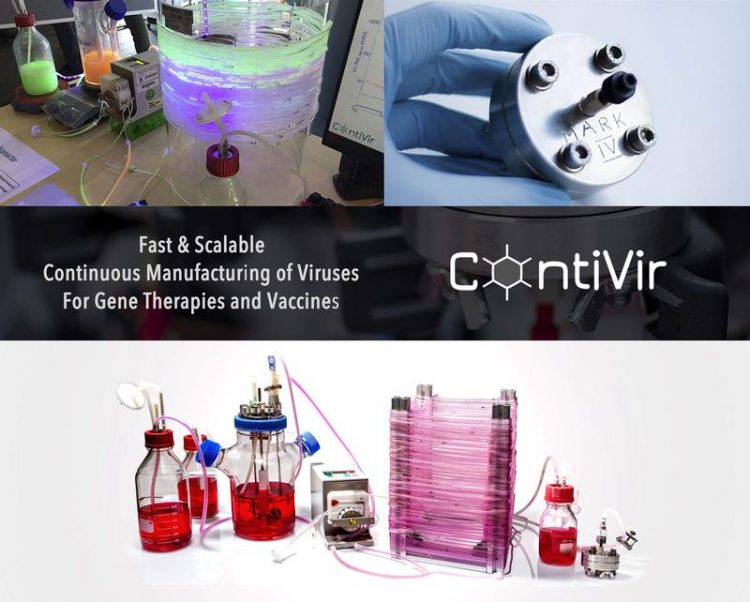Continuous Manufacturing Platform for Commercially Relevant Viral Gene Therapy Vectors

ContiVir project will focus on the development of a continuous manufacturing platform for commercially relevant viral gene therapy vectors ContiVir / Felipe Tapia und Pavel Marichal
Gene therapies have shown the promise to become the next medical revolution for combating a wide variety of currently untreatable diseases. The most common delivery method for gene therapy are with viral vectors: genetically engineered viruses used as vehicles to introduce genetic material into the patient’s cells to replace defective genes by healthy ones. Currently, gene therapies cost from hundreds of thousands to millions of euros per patient.
A significant increase in the demand for viral gene therapy vectors is expected in the future, evidenced by both the market authorization of the first gene therapies in Europe and the US in recent years, and more than a thousand treatments in clinical phase. It is estimated that nowadays the demand for viral gene therapy vectors is five times higher than the current supply.
A major bottleneck in the supply of viral vectors is requirement for high dose titers and inefficient production techniques based on batch technologies meant for laboratory use. The latter are incredibly difficult to scale-up for commercial production and require large amounts of time and labor.
The EXIST-Transfer of Research project started aims to tackle some of the manufacturing issues described above by combining two disruptive new technologies established by the Bioprocess Engineering group of the MPI Magdeburg.
Tubular Bioreactor combined with a Membrane-Based Chromatography Technique
The first technology is a continuous tubular bioreactor developed by Felipe Tapia in the Upstream Processing team of PD. Dr. Yvonne Genzel. This bioreactor is the first fully continuous system for the production of virus particles and has a footprint twenty times smaller than current batch systems. Additionally, continuous processes have higher productivity than batch cultures for large volumes, consume less energy, and require less labor.
original
The viral vectors produced in the tubular bioreactor will be purified with a membrane-based chromatography technique developed by Pavel Marichal in the Downstream Processing team of Prof. Dr. Michael Wolff (now at the Technische Hochschule Mittelhessen, University of Applied Sciences in Giessen, Germany).
The purification method, named steric exclusion chromatography (SXC), can be used to concentrate and purify a wide variety of viruses with high product yields using very similar process conditions supporting short process development. SXC uses low-cost materials and is easily scalable.
Both technologies will be integrated in a fully continuous manufacturing process that has the potential to meet the future demand of viral vectors to make gene therapies widely available to the general population.
This manufacturing platform can also be used to support the production of viral vaccines in large quantities during pandemics, such as the current coronavirus outbreak that is considered by many countries as the worst crisis since World War 2.
The project will be carried out in the laboratories of the MPI Magdeburg and the Otto von Guericke University Magdeburg.
https://www.mpi-magdeburg.mpg.de/3925352/2020-04-15-contivir-exist-projekt?c=301…
https://www.contivir.com/
Media Contact
All latest news from the category: Life Sciences and Chemistry
Articles and reports from the Life Sciences and chemistry area deal with applied and basic research into modern biology, chemistry and human medicine.
Valuable information can be found on a range of life sciences fields including bacteriology, biochemistry, bionics, bioinformatics, biophysics, biotechnology, genetics, geobotany, human biology, marine biology, microbiology, molecular biology, cellular biology, zoology, bioinorganic chemistry, microchemistry and environmental chemistry.
Newest articles

New theory reveals the shape of a single photon
A new theory, that explains how light and matter interact at the quantum level has enabled researchers to define for the first time the precise shape of a single photon….

Perovskite research boosts solar cell efficiency and product life
An international team led by the University of Surrey with Imperial College London have identified a strategy to improve both the performance and stability for solar cells made out of…

Neuroscientists discover how the brain slows anxious breathing
Salk scientists identify brain circuit used to consciously slow breathing and confirm this reduces anxiety and negative emotions. Deep breath in, slow breath out… Isn’t it odd that we can…



